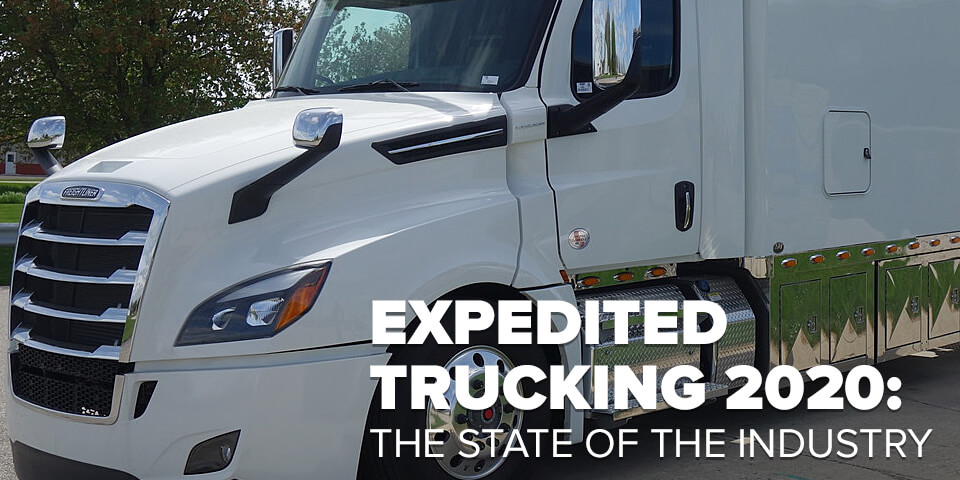
Expedited Trucking 2020: The State of the Industry
For many in the expedited trucking industry, 2019 brought strong headwinds and a lot of economic pain and uncertainty, despite continued records highs in the stock market.
So, can we expect the headwinds to die down any time soon? Or, are there still storms ahead that we need to watch for?
EO spoke with John Elliott, chief executive officer for Load One LLC, and Jeff Curry, chief executive officer for Premium Transportation Logistics, asking them to peer into their crystal ball and share what they see for 2020.
Here are their insights.
The State of the Expedited Trucking Industry Is __________.
"Murky," says Elliott. "I've seen a lot of carriers going through struggles. And I think the next six months is going to be a big shakeout period, as far as numbers of trucks and bankruptcies. You just saw Celadon go bankrupt, and that was the largest trucking failure in history. I think that there's much more to follow. But I also think the second half of this year will be better. I hate to say it, but in this [market], it's going to come down to the old [adage], the strong will survive."
Curry offers a similar outlook. "I'd say the state of expediting in 2020 is 'yet to be determined,' says Curry. "It's really a work in process right now. And part of that is we're also in what is typically a slow part of the year. So it's very difficult in January to assess 2020, especially when you're coming off a challenging year like 2019. It's difficult to tell because we don't know how much of what we're experiencing right now is just normal seasonality."
Skyrocketing Insurance Costs
In addition to overcapacity and lower rates, one challenge that has made a significant on trucking company operations in the past year is a surge in insurance costs.
"The insurance market has become tough," says Curry. "It's challenging to get coverage at rates where you're able to keep your costs in check."
Says Elliott, "Many of the trucking failures are because of this issue with insurance-the premiums are skyrocketing right now. I know of decent carriers that are seeing anywhere from 25% to 40% or more increases on renewals."
What's driving these higher rates?
"Number one, you hear a lot of discussions lately about nuclear verdicts [with multimillion-dollar payouts]," says Curry. "So that's certainly a driver because when the verdicts are massive, that affects premiums. Insurance companies are built to charge more in premiums than they think they're going to pay out in losses. And lately, they're paying out a lot in losses. So, when they start paying out more in losses, the premiums go up."
Trimming the Fat
Elliott says that what we're seeing right now is a trimming of the fat in the industry.
"Everybody wants to stay optimistic and assume that [a strong market] is going to keep on going forever, but that doesn't happen," says Elliott. "You'll have to go through a natural right-sizing every so often. Unfortunately, a lot of companies, when the market was good [in 2018], they jumped in and perhaps didn't understand their costs or pricing properly. That affects the pricing in the market. But you have to make sure your rates are at a sustainable number. So, I think there's going to be a lot of fat-excess capacity-taken out of the market over the next six months."
Survival of the Fittest
Both Elliott and Curry say that 2020 will reveal the strong trucking companies and weed out the weaker ones. But what exactly defines a "strong company"? What does it look like? And as a driver, owner-operator, or fleet owner, what should you look for in a carrier that's in a strong position to weather the storm?
"A strong company has a strong balance sheet," says Curry. "That's because when the times were good, they lined their pockets to strengthen their balance sheet so that, when times do slide a bit, they're prepared to weather the storm. There's always a bit of a roller coaster ride in this business, right? With our economy and everything, you've got to have the balance sheet in place to weather the storm."
Elliott says that the trucking carriers that develop relationships directly with shippers through their sales teams, instead of being completely dependent on load boards for freight, are the best positioned to succeed in the current market.
Curry agrees. "When you're looking at a trucking company, do they have the sales team and sales processes that enable them to differentiate themselves from the others?" says Curry. "The companies that have the sales machines in place, they're going to win in this market. They're going to win because they're driving new business. And especially in slow times, sales is what keeps the drivers coming in and staying with you. It's the juice that can propel a company through these really challenging times right now."
***
